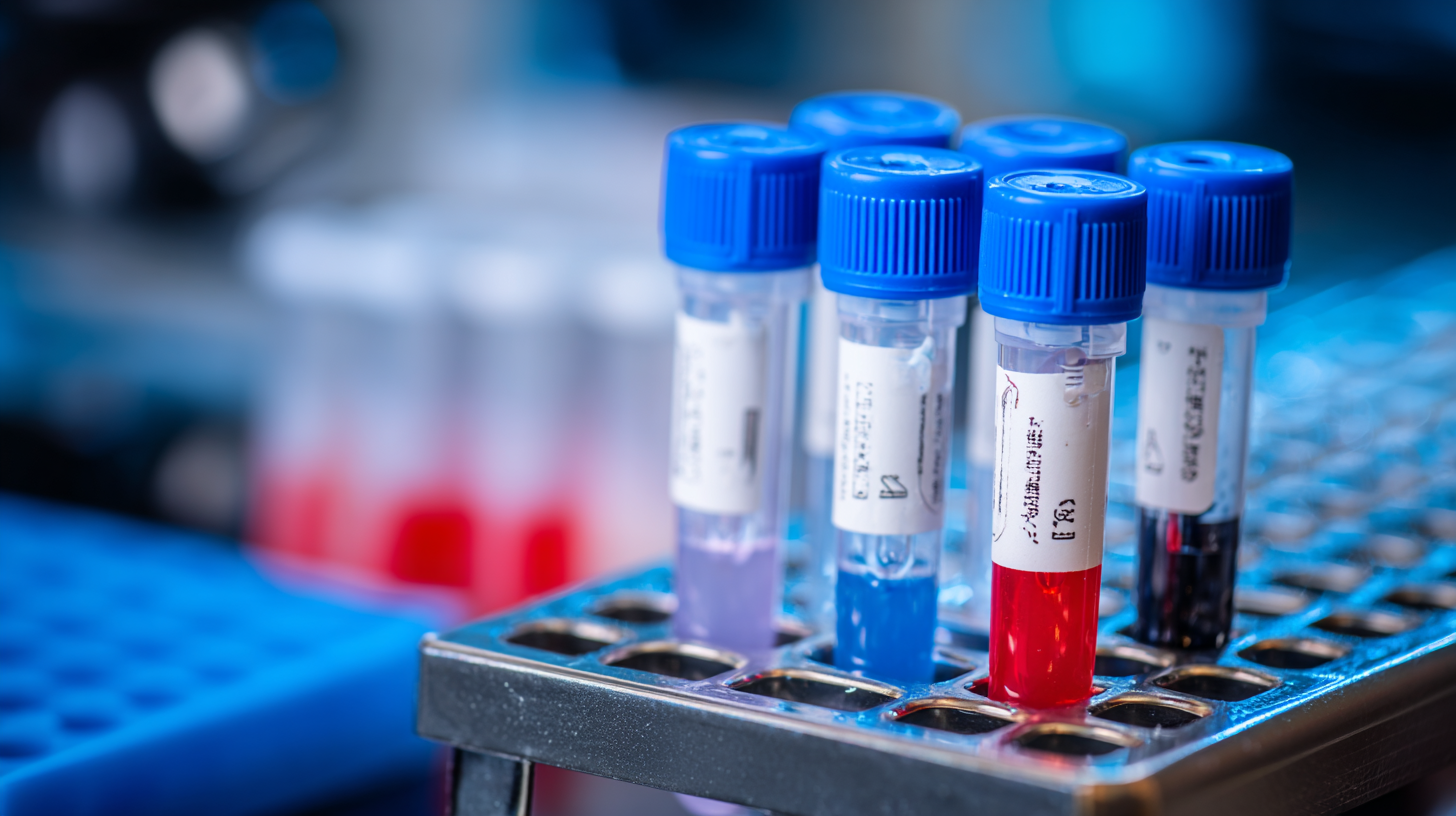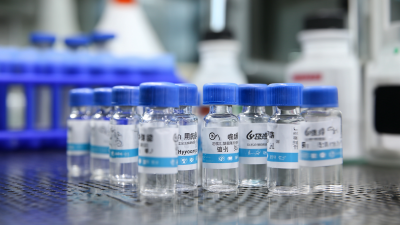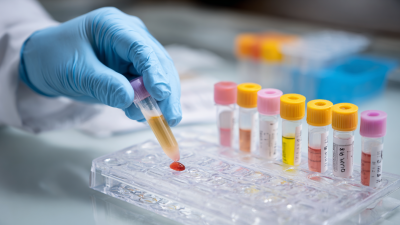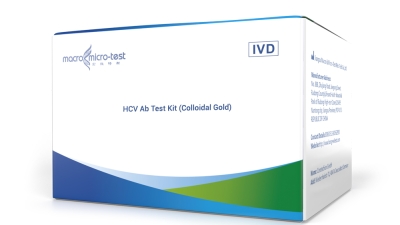Solutions for Effective Detection of Helicobacter Pylori with Innovative Testing Kits
Table of Contents
- Innovative Testing Kits: An Overview of Helicobacter Pylori Detection Solutions
- Key Features to Look for in Effective Testing Kits for Helicobacter Pylori
- Step-by-Step Guide to Using Helicobacter Pylori Detection Kits
- Interpreting Results: What Your Helicobacter Pylori Test Really Means
- Comparative Analysis: Home Tests vs. Laboratory Tests for Helicobacter Pylori
- Emerging Technologies in Helicobacter Pylori Testing: The Future of Diagnosis
- Understanding HCV Ab Test Kit: Importance, Usage, and Insights for Effective Hepatitis C Screening
- FAQS
- Conclusion
- Related Posts
Did you know that Helicobacter pylori, a type of gram-negative bacteria, is actually one of the main culprits behind stomach issues around the world? In fact, almost half of the folks globally are infected, according to the World Health Organization. Figuring out if someone has this bacteria is pretty important because it can lead to serious problems like ulcers or even stomach cancer. At Jiangsu Macro & Micro-Test Med-Tech Co., Ltd., we’ve been passionate about creating better diagnostic tools since 2010. Our latest Helicobacter Pylori Kit Test is a great example of how we’re committed to making testing accurate, quick, and reliable. With more and more people wanting easy and effective testing options, innovations like ours really make a difference—helping patients get the care they need faster and making healthcare smoother overall.

Innovative Testing Kits: An Overview of Helicobacter Pylori Detection Solutions
Hey there! So, have you heard about Helicobacter pylori, or H. pylori for short? It’s this spiral-shaped bacteria that's been linked to stuff like gastritis, peptic ulcers, and even stomach cancer. Turns out, about half the people around the world are walking around with it – which makes catching and treating it a pretty big deal. The problem is, traditional ways to diagnose it, like doing an endoscopy or taking a biopsy, can be pretty invasive and expensive. That's why there's a real push for smarter, less invasive testing methods that give quick results.

Thanks to some pretty exciting innovations, we now have a bunch of new testing kits—things like breath tests, stool antigen tests, and serology tests. According to a report from Global Market Insights, the market for H. pylori testing is expected to hit nearly $1.5 billion by 2026. That just shows how much things are shifting toward more efficient and patient-friendly ways of testing. For example, breath tests are super handy—they can deliver results in just a few minutes and have over 90% accuracy, which is why so many doctors prefer them.
And it's not stopping there. New tech like point-of-care tests and PCR-based kits are really changing the game. One recent study found that PCR methods can detect even tiny amounts of bacteria with amazing accuracy, making early diagnosis way easier. As the need for better detection grows, these innovative testing tools are set to revolutionize how healthcare providers identify and handle H. pylori infections worldwide. Pretty cool, right?
Key Features to Look for in Effective Testing Kits for Helicobacter Pylori
So, when you're picking out testing kits for Helicobacter pylori, it's pretty important to pay attention to a few key features that actually impact how well they work. The market for H. pylori tests is expected to really take off—the global outlook suggests it could hit around 1.4 billion USD by 2035, growing at about 7% a year. There are all sorts of test types out there—some invasive, like histology, and others non-invasive, such as blood serology tests or the urea breath test. Knowing how effective each one is really matters. Lately, there's been a surge in quick, point-of-care testing kits that spit out results fast, which is a game-changer for getting timely treatment. They’re super handy, especially in busy clinics or even on the go.
Oh, and if you’re into newer tech, look out for testing kits that use cool innovations like silver nanoparticles—these are known for their special antibacterial properties. They boost the test’s sensitivity and accuracy, making it easier to detect the bacteria. Portability’s also a big deal now; portable, paper-based platforms that can enrich nucleic acids are gaining popularity for field testing—they’re super convenient without messing with the test’s reliability. Before you go ahead and use any kit, make sure there are validation studies backing it up. That way, you can trust the results in real clinical settings without worries.
Step-by-Step Guide to Using Helicobacter Pylori Detection Kits
Using Helicobacter pylori detection kits can really make diagnosing this common but potentially nasty bacteria a lot smoother. First off, it’s super important to pick the right type of test based on what you need—whether that’s a breath test, stool antigen test, or blood antibody test. Each one has its perks, so choosing the right one can actually make your results more reliable.
Once you’ve got your kit in hand, just follow the instructions carefully. Most kits come with a step-by-step guide on how to collect your samples, and getting this right is super important for accurate results. For example, if you're doing a breath test, make sure you know what dietary restrictions you need to follow beforehand—trust me, it makes a difference! After collecting your sample, handle it properly—this might mean quick processing or storing it the right way to keep everything fresh and valid.
When everything’s done, take some time to interpret your results carefully. Depending on the kit, you might get your answers in a few minutes, or it might take a couple of days. If your test comes back positive, it’s a good idea to chat with your doctor for the next steps—more tests, treatment, whatever’s needed. Thanks to these handy testing kits, checking for Helicobacter pylori has become easier and less complicated, helping you catch and prevent associated gut issues early on.
Helicobacter Pylori Detection Rates Using Innovative Testing Kits
Interpreting Results: What Your Helicobacter Pylori Test Really Means
If you've recently gotten your H. pylori test results, it’s super important to really understand what they mean for your health. Did you know that roughly half the people worldwide carry this bacteria? It’s especially common in developing countries, as the World Health Organization points out. H. pylori can cause all sorts of stomach issues, like chronic gastritis and ulcers—problems that can get pretty serious if you ignore them.
Figuring out what your test results say can depend a lot on what kind of test you had—whether it was a breath test, stool sample, or even a biopsy during a procedure. For example, if your breath test comes back positive, it probably means you have an active infection that needs treatment. On the other hand, a negative result might just mean you’ve already cleared it or were never infected in the first place.
Recent research from the Journal of Gastroenterology shows that new testing kits are making results more accurate, which really helps doctors decide what to do next. The best thing you can do is chat with your doctor, go over your results, and figure out the next steps based on current guidelines. Don’t hesitate to ask questions—that's what they’re there for!
Comparative Analysis: Home Tests vs. Laboratory Tests for Helicobacter Pylori
Lately, there's been quite a rise in infections caused by Helicobacter pylori, which has led to more
testing options popping up. If you're trying to figure out which test to pick—home or lab—it's good to understand the main differences.
Home tests are super convenient and keep things private—you can do the sampling right in your house without needing to see a doctor.
Usually, they come in quick kits that are pretty straightforward to use, but keep in mind, their accuracy can vary a lot. Sometimes they
might give you a false positive or negative, so it's not always foolproof. On the other hand, lab tests tend to be way more reliable because they're done in controlled settings. They include options like
breath tests, stool samples, or even biopsies, all analyzed by professionals who can give you detailed results. Sure, you might need
to visit a healthcare facility for these, but honestly, getting an accurate diagnosis is totally worth the trip—it gives you
peace of mind.
On the other hand, lab tests tend to be way more reliable because they're done in controlled settings. They include options like
breath tests, stool samples, or even biopsies, all analyzed by professionals who can give you detailed results. Sure, you might need
to visit a healthcare facility for these, but honestly, getting an accurate diagnosis is totally worth the trip—it gives you
peace of mind.
Some tips to help you choose the right Helicobacter pylori test:
- Think about whether you prioritize convenience or accuracy; if your symptoms stick around, it's probably a good idea to see a doctor and opt for a lab test.
- Make sure the home test kit is FDA-approved—this way, you’re more likely to get a reliable result.
- If you're doing a home test, just make sure to follow the instructions carefully so you don’t mess up the sample collection and skew the results.
Emerging Technologies in Helicobacter Pylori Testing: The Future of Diagnosis
You know, the way new technologies are changing how we test for Helicobacter pylori is pretty amazing. I mean, the old methods like endoscopy and urea breath tests have worked okay, but they do come with their fair share of issues — like how uncomfortable they can be or sometimes not being super accurate. Now, though, there are new testing kits coming out that use really advanced stuff like molecular techniques and biosensor tech. These new tools can quickly and accurately tell if someone has H. pylori, which means doctors can get to the bottom of things faster and start treatment sooner.
One of the coolest innovations I’ve heard about is using CRISPR in these testing kits — it makes detecting H. pylori way more sensitive and precise. Plus, there are portable, point-of-care devices that healthcare providers can use pretty much anywhere, whether it’s a busy clinic or a remote village. All these advances really improve the patient experience — less invasive stuff, quicker results, and better overall diagnostics.
As these techs keep improving, I really believe they could totally change the game when it comes to managing H. pylori infections, leading to better health for people all over the world.
Understanding HCV Ab Test Kit: Importance, Usage, and Insights for Effective Hepatitis C Screening
Hepatitis C virus (HCV) is a significant global health challenge, yet early detection can lead to better management and treatment options. The HCV Ab Test Kit plays a crucial role in this process, providing a means for the qualitative detection of HCV antibodies in human serum or plasma. This in vitro test is not only essential for the auxiliary diagnosis of patients suspected of being infected with HCV but is also instrumental in screening populations in areas with high infection rates.
The importance of the HCV Ab Test Kit cannot be overstated, especially in regions where the prevalence of Hepatitis C is alarming. By effectively identifying individuals with antibodies to the virus, healthcare providers can make informed decisions about further diagnostic testing and treatment pathways. The kit allows for a rapid and reliable way to detect HCV infections, which is critical for curbing the spread of the virus and implementing appropriate public health measures. Moreover, enhancing awareness about the utility of this test kit can empower more people to seek screening, leading to early detection and treatment—ultimately improving health outcomes for those at risk of Hepatitis C.
In conclusion, the HCV Ab Test Kit serves as a pivotal tool in the fight against Hepatitis C. By understanding its importance and promoting its usage, we can advocate for effective hepatitis C screening and contribute to the broader effort of managing this infection. Emphasizing the kit's role not only fosters awareness but also encourages proactive healthcare behaviors among at-risk populations.
FAQS
: Look for kits that utilize advanced technologies, such as silver nanoparticles for enhanced sensitivity and specificity, rapid results through point-of-care testing, portability for field testing, and validation studies supporting their performance.
Interpretation varies by test type; for example, a positive breath test indicates active infection and treatment is needed, while negative results may suggest past exposure or successful eradication. It's best to consult a medical professional for a thorough understanding.
Home tests provide convenience and privacy but may have variable accuracy, while laboratory tests are more reliable due to controlled conditions and professional analysis, though they require a visit to a healthcare facility.
Approximately 50% of the global population is estimated to be infected with H. pylori, with much higher incidence rates in developing countries.
H. pylori is a leading cause of chronic gastritis and peptic ulcer disease, which can lead to more severe complications if not treated.
Yes, if symptoms continue despite testing, consulting a healthcare provider for laboratory tests is advisable for accurate diagnosis and appropriate treatment.
Yes, you can find FDA-approved home test kits which provide a certain level of reliability; however, it's crucial to follow instructions carefully to minimize errors in sample collection.
Testing methods include invasive procedures like biopsies and non-invasive options such as breath tests and stool antigen tests.
Home testing can be less accurate, with potential false positives or negatives, while laboratory testing is conducted under strict conditions, ensuring higher reliability.
Conclusion
With more and more folks dealing with Helicobacter Pylori infections these days, it’s no wonder that new testing kits have popped up as pretty important tools for figuring things out. In this post, I’ll walk you through some of the latest Helicobacter Pylori kit tests—talking about what really matters, like how sensitive and specific they are, and how easy they are to use. I’ll also give you a simple step-by-step guide on how to use these kits properly, plus some tips on how to read the results so you can get a clearer idea of what they mean for your health.
We’ll also take a quick look at how home tests stack up against lab tests for Helicobacter Pylori—what’s good, what might be a bit limiting. And looking ahead, there are some pretty exciting new technologies on the horizon that could totally change how we diagnose this infection. Here at Jiangsu Macro & Micro-Test Med-Tech Co., Ltd., we’re all about bringing innovative, reliable diagnostic tools to the table to help you stay on top of your health.
Related Posts
-

The Future of Best tt3 Innovations in Efficiency and Performance
-

Discover Top-Quality Hpylori Test Solutions from Premier Chinese Manufacturers
-

Exploring the Features and Applications of Cervical Cancer Self Test Kits: A Comprehensive Guide
-

Future Trends in Gene Cyp2c19 Market Analysis for 2025 and Beyond
-

Chinese Excellence in Manufacturing Best Malaria PV Driving Global Supply Chain Solutions
-

The Future of Rapid Testing Solutions for Malaria Wholesale Suppliers


